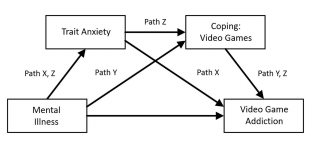Iowa state research shows that some may be at more risk for video game addiction

Photo Courtesy of: Douglas Gentile
The possible pathways to video game addiction.
November 6, 2018
Studies show that some people may be more at risk for video game addiction than others.
Douglas Gentile, professor of psychology, and some colleagues at Iowa State conducted a study to see how the use of video games as a coping strategy can lead to video game addiction.
“One of the ways addiction starts is by dysregulated coping,” Gentile said. “What starts as functional coping becomes dysfunctional.”
Gentile said video game addiction is defined by how much it damages your life. It can hurt multiple aspects of your life, such as social and family functioning and work and school functioning.
Gentile and his colleagues found that people who have high anxiety and serious mental health symptoms, such as depression or attention deficit, are more likely to use video games as a negative coping strategy and become addicted.
“If you have a reason to need to cope, and you use games to cope, that can predict higher addiction symptoms,” Gentile said.
There are positive and negative strategies to coping. Gentile explained that positive strategies are ones that actually help, and negative ones are strategies that are mostly used as a distraction.
Although there is no specific age that people are more likely to get addicted, Gentile said that generally adolescents between the ages of 13 and 25 are at a higher risk to be addicted to anything than others are.
“We don’t know all the reasons [why],” said Gentile. “One reason is that the prefrontal cortex is not fully developed, which helps [us] think about ‘should I do this or shouldn’t I’.”
However, video game addiction is treatable. Gentile said he believes that it is a type of impulse control disorder, where you know you should stop, but you just can’t manage the impulse. His opinion is that it should be treated by cognitive behavioral therapy where therapists help people recognize and manage the impulse. Some therapists think that people need to quit video games altogether in order stop the addiction. There are very different opinions and suggestions about how the treatment should work.
“You let it go from being a passion to an obsession,” Gentile said. “You let it go from being something you enjoy to something that’s controlling you.”
Former undergraduate and graduate students Christopher Groves, Adam Modlin and Jorge Blanco-Herrera all contributed to the research.






